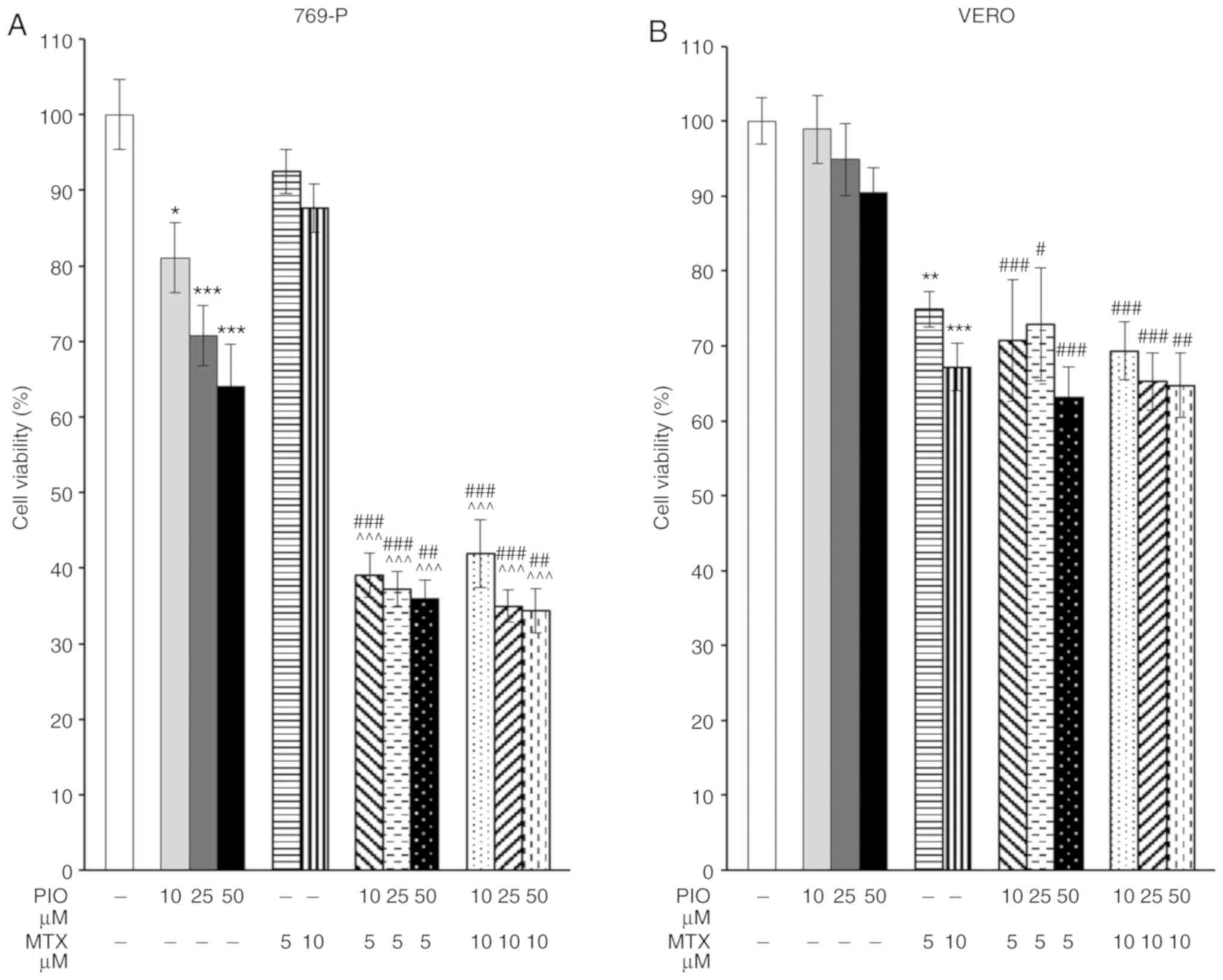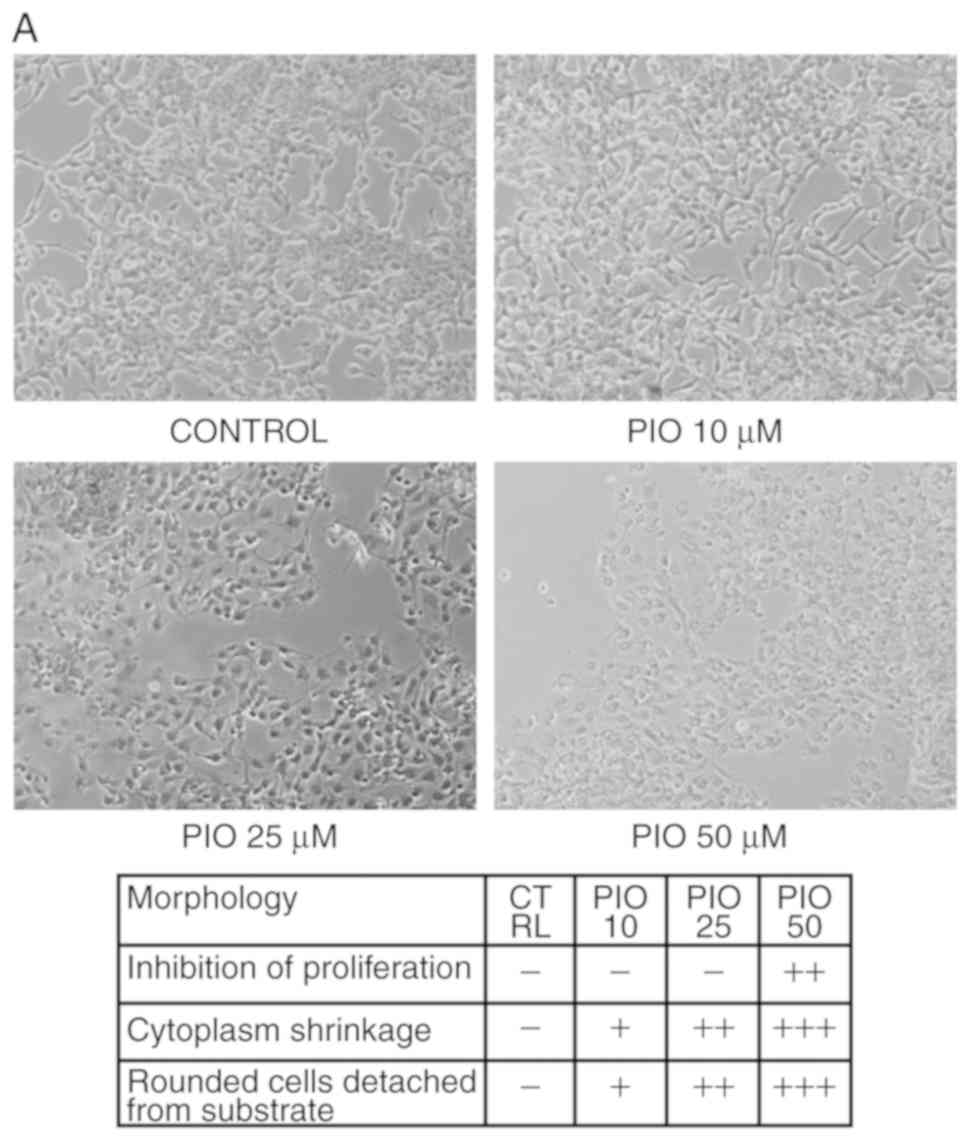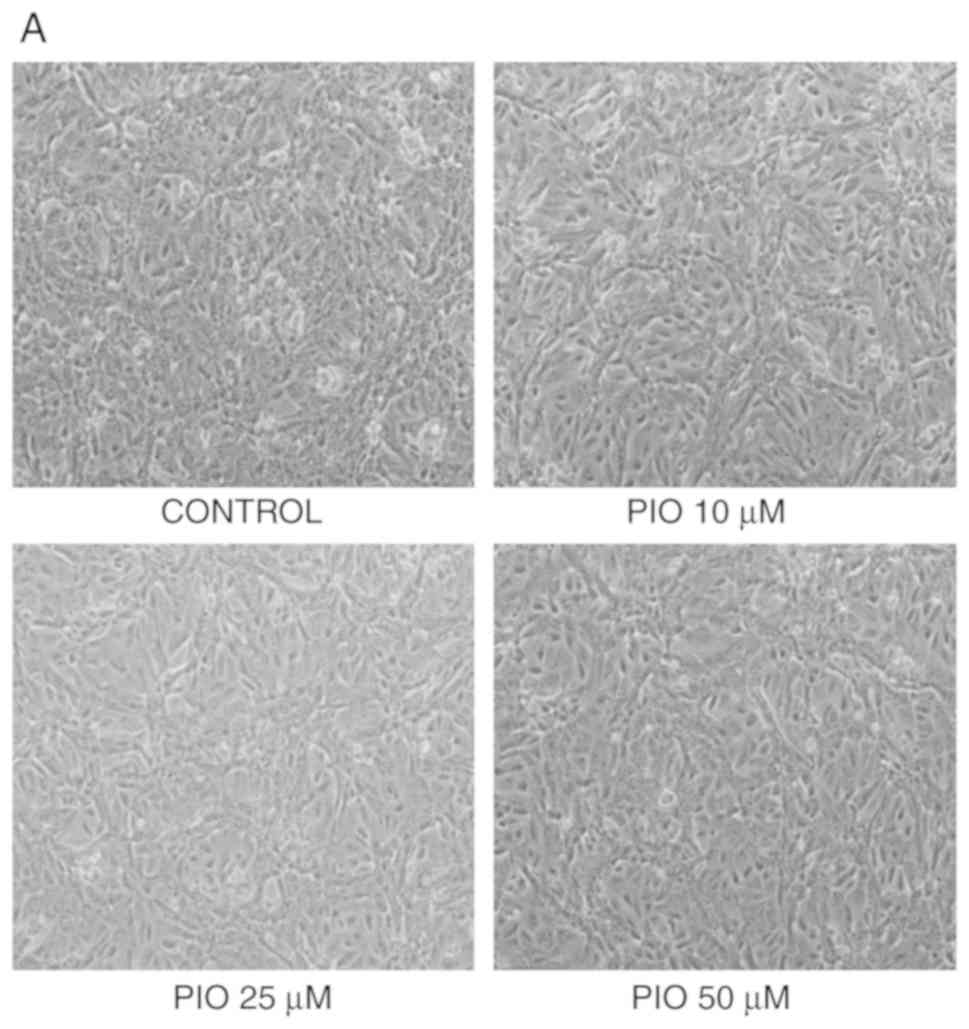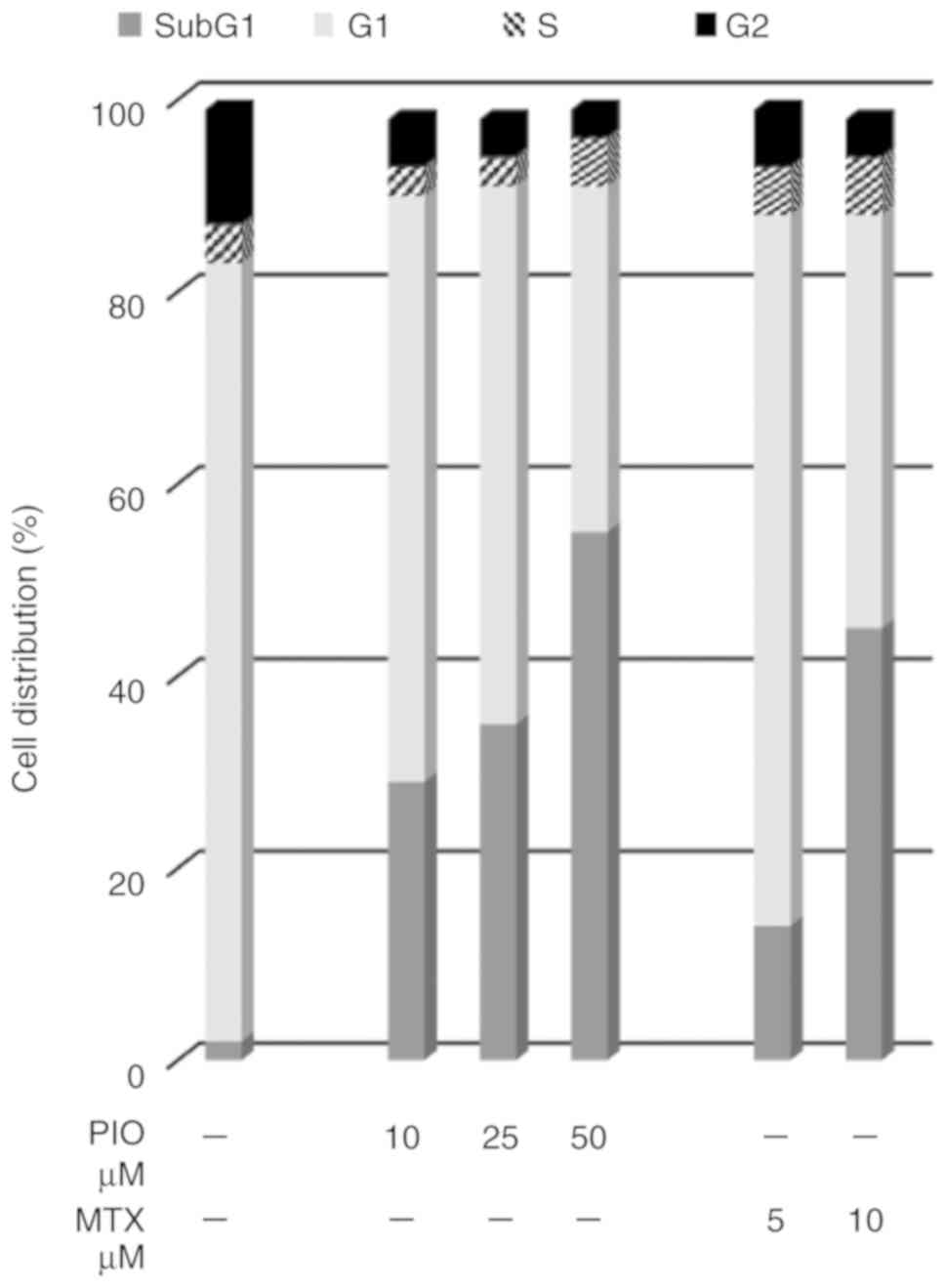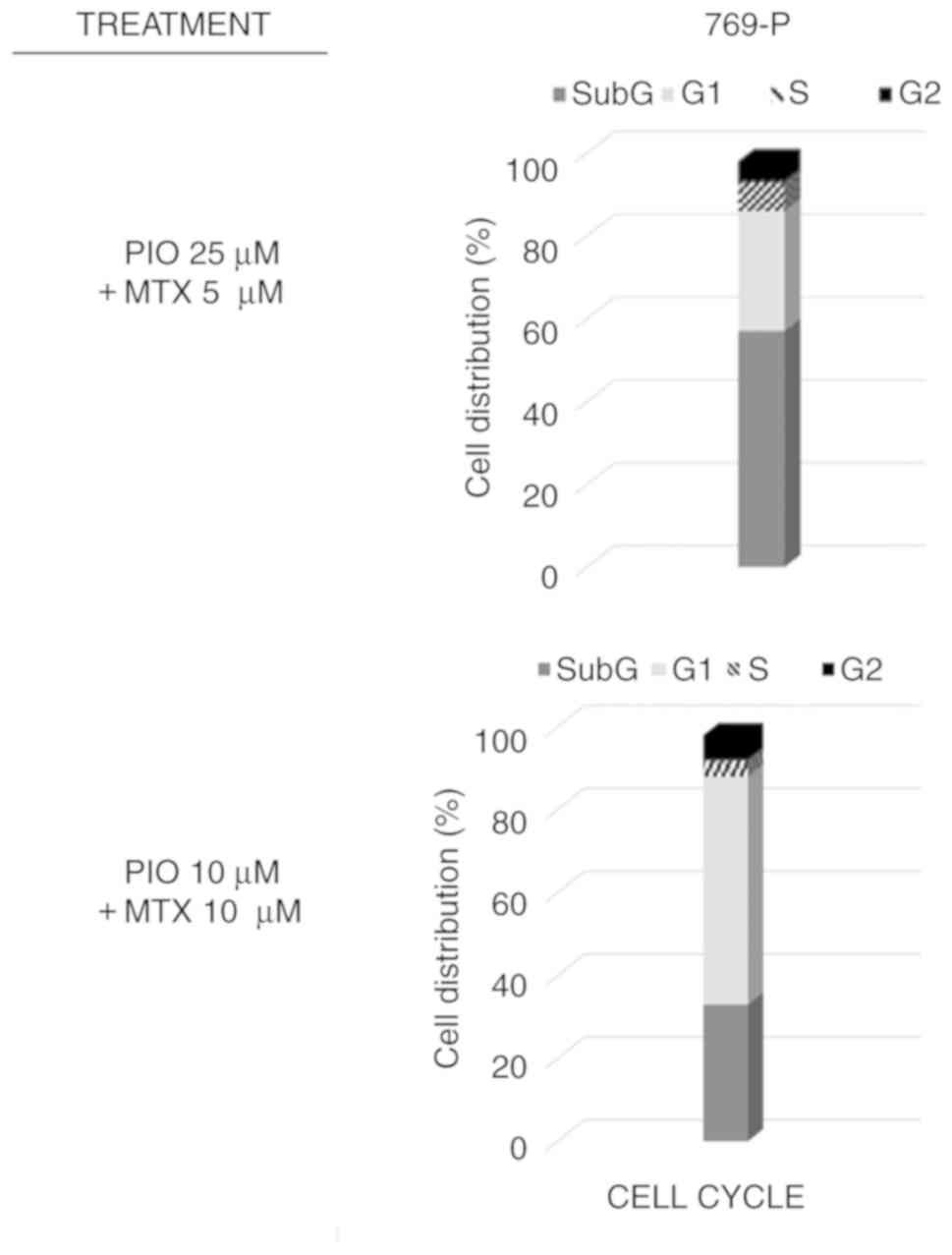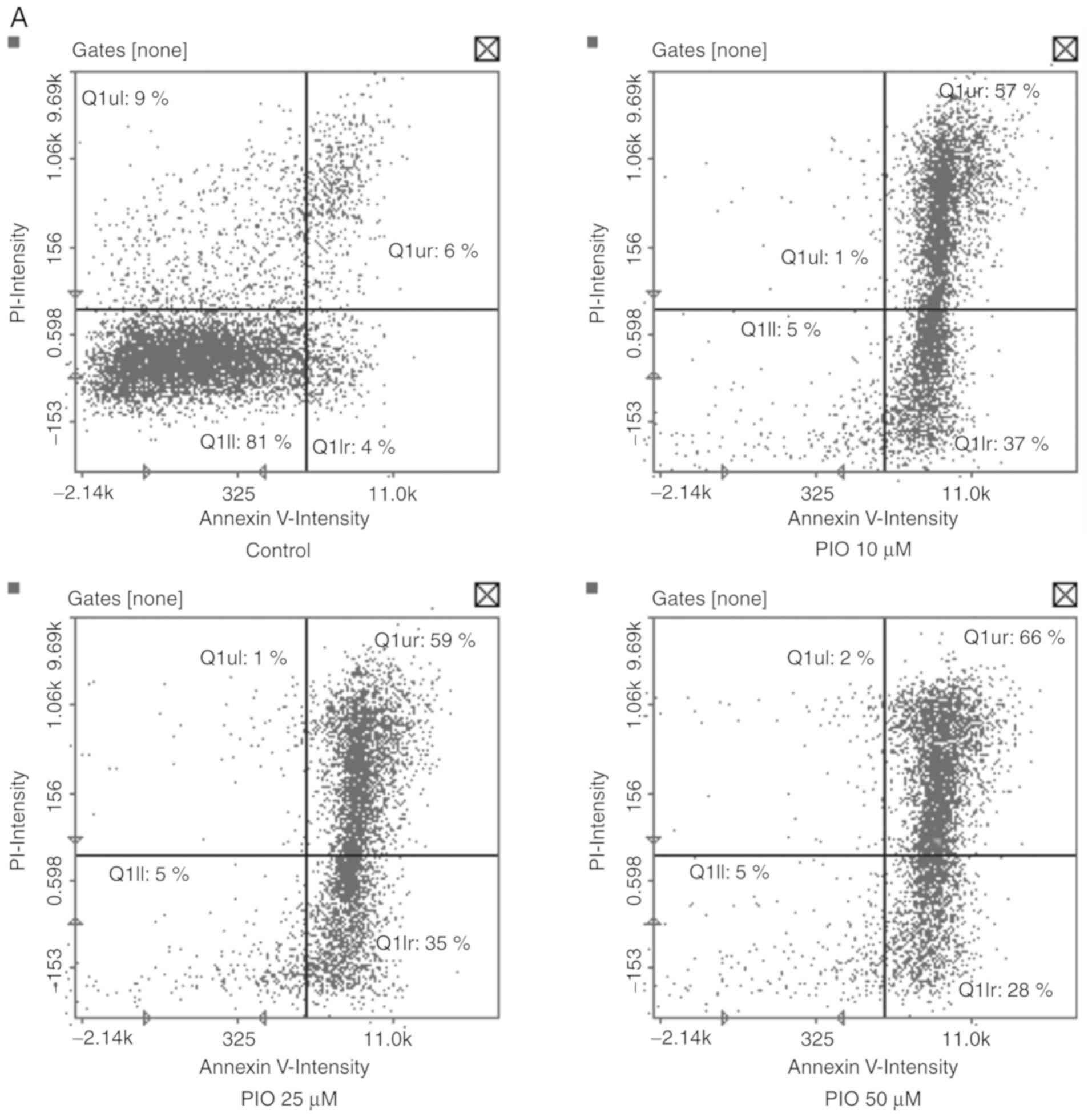|
1
|
Siegel RL, Miller KD and Jemal A: Cancer
statistics, 2018. CA Cancer J Clin. 68:7–30. 2018. View Article : Google Scholar : PubMed/NCBI
|
|
2
|
Torre LA, Siegel RL, Ward EM and Jemal A:
Global cancer incidence and mortality rates and trends-an update.
Cancer Epidemiol Biomarkers Prev. 25:16–27. 2016. View Article : Google Scholar : PubMed/NCBI
|
|
3
|
Al-Dimassi S, Abou-Antoun T and El-Sibai
M: Cancer cell resistance mechanisms: A mini review. Clin Transl
Oncol. 16:511–516. 2014. View Article : Google Scholar : PubMed/NCBI
|
|
4
|
Hanahan D and Weinberg RA: Hallmarks of
cancer: The next generation. Cell. 144:646–674. 2011. View Article : Google Scholar : PubMed/NCBI
|
|
5
|
Ljungberg B, Campbell SC, Choi HY, Jacqmin
D, Lee JE, Weikert S and Kiemeney LA: The epidemiology of renal
cell carcinoma. Eur Urol. 60:615–621. 2011. View Article : Google Scholar : PubMed/NCBI
|
|
6
|
Cancer Research UK: Kidney cancer
statistics. https://www.cancerresearchuk.org/health-professional/cancer-statistics/statistics-by-cancer-type/kidney-cancer/incidence-heading-ZeroApril
13–2019
|
|
7
|
Lipworth L, Tarone RE, Lund L and
McLaughlin JK: Epidemiologic characteristics and risk factors for
renal cell cancer. Clin Epidemiol. 1:33–43. 2009.PubMed/NCBI
|
|
8
|
Capitanio U, Bensalah K, Bex A, Boorjian
SA, Bray F, Coleman J, Gore JL, Sun M, Wood C and Russo P:
Epidemiology of renal cell carcinoma. Eur Urol. 75:74–84. 2019.
View Article : Google Scholar : PubMed/NCBI
|
|
9
|
Mathew A, Devesa SS, Fraumeni JF Jr and
Chow WH: Global increases in kidney cancer incidence, 1973–1992.
Eur J Cancer Prev. 11:171–178. 2002. View Article : Google Scholar : PubMed/NCBI
|
|
10
|
Habib SL, Prihoda TJ, Luna M and Werner
SA: Diabetes and risk of renal cell carcinoma. J Cancer. 3:42–48.
2012. View
Article : Google Scholar : PubMed/NCBI
|
|
11
|
Shi Y and Hu FB: The global implications
of diabetes and cancer. Lancet. 383:1947–1948. 2014. View Article : Google Scholar : PubMed/NCBI
|
|
12
|
Song XS, Fan B, Ma C, Yu ZL, Bai SS, Zhang
Z, Zhao H, Zhu XQ, He SL, Chen F, et al: Clinical research on the
correlations between type 2 diabetes mellitus and renal clear cell
carcinoma. Zhonghua Wai Ke Za Zhi. 51:627–630. 2013.(In Chinese).
PubMed/NCBI
|
|
13
|
Hou Y, Zhou M, Xie J, Chao P, Feng Q and
Wu J: High glucose levels promote the proliferation of breast
cancer cells through GTPases. Breast Cancer (Dove Med Press).
9:429–436. 2017.PubMed/NCBI
|
|
14
|
Giovannucci E, Harlan DM, Archer MC,
Bergenstal RM, Gapstur SM, Habel LA, Pollak M, Regensteiner JG and
Yee D: Diabetes and cancer: A consensus report. Diabetes Care.
33:1674–1685. 2010. View Article : Google Scholar : PubMed/NCBI
|
|
15
|
Psutka SP, Stewart SB, Boorjian SA, Lohse
CM, Tollefson MK, Cheville JC, Leibovich BC and Thompson RH:
Diabetes mellitus is independently associated with an increased
risk of mortality in patients with clear cell renal cell carcinoma.
J Urol. 192:1620–1627. 2014. View Article : Google Scholar : PubMed/NCBI
|
|
16
|
Sen S, He Y, Koya D and Kanasaki K: Cancer
biology in diabetes. J Diabetes Investig. 5:251–264. 2014.
View Article : Google Scholar : PubMed/NCBI
|
|
17
|
Pearson-Stuttard J, Zhou B, Kontis V,
Bentham J, Gunter MJ and Ezzati M: Worldwide burden of cancer
attributable to diabetes and high body-mass index: A comparative
risk assessment. Lancet Diabetes Endocrinol. 6:95–104. 2018.
View Article : Google Scholar : PubMed/NCBI
|
|
18
|
Kasznicki J, Sliwinska A and Drzewoski J:
Metformin in cancer prevention and therapy. Ann Transl Med.
2:572014.PubMed/NCBI
|
|
19
|
Zhu C, Wei J, Tian X, Li Y and Li X:
Prognostic role of PPAR-γ and PTEN in the renal cell carcinoma. Int
J Clin Exp Pathol. 8:12668–12677. 2015.PubMed/NCBI
|
|
20
|
Liu J, Li M, Song B, Jia C, Zhang L, Bai X
and Hu W: Metformin inhibits renal cell carcinoma in vitro and in
vivo xenograft. Urol Oncol. 31:264–270. 2013. View Article : Google Scholar : PubMed/NCBI
|
|
21
|
Yuan J, Takahashi A, Masumori N, Uchida K,
Hisasue S, Kitamura H, Itoh N and Tsukamoto T: Ligands for
peroxisome proliferator-activated receptor gamma have potent
antitumor effect against human renal cell carcinoma. Urology.
65:594–599. 2005. View Article : Google Scholar : PubMed/NCBI
|
|
22
|
Grygiel-Górniak B: Peroxisome
proliferator-activated receptors and their ligands: Nutritional and
clinical implications-a review. Nutr J. 13:17–25. 2014. View Article : Google Scholar : PubMed/NCBI
|
|
23
|
Fröhlich E and Wahl R: Chemotherapy and
chemoprevention by thiazolidinediones. BioMed Res Int.
2015:8453402015. View Article : Google Scholar : PubMed/NCBI
|
|
24
|
Zhang GY, Ahmed N, Riley C, Oliva K,
Barker G, Quinn MA and Rice GE: Enhanced expression of peroxisome
proliferator-activated receptor gamma in epithelial ovarian
carcinoma. Br J Cancer. 92:113–119. 2005. View Article : Google Scholar : PubMed/NCBI
|
|
25
|
Inoue K, Kawahito Y, Tsubouchi Y, Kohno M,
Yoshimura R, Yoshikawa T and Sano H: Expression of peroxisome
proliferator-activated receptor gamma in renal cell carcinoma and
growth inhibition by its agonists. Biochem Biophys Res Commun.
287:727–732. 2001. View Article : Google Scholar : PubMed/NCBI
|
|
26
|
Bull AW: The role of peroxisome
proliferator-activated receptor gamma in colon cancer and
inflammatory bowel disease. Arch Pathol Lab Med. 127:1121–1123.
2003.PubMed/NCBI
|
|
27
|
Smith MR and Kantoff PW: Peroxisome
proliferator-activated receptor gamma (PPAR gamma) as a novel
target for prostate cancer. Invest New Drugs. 20:195–200. 2002.
View Article : Google Scholar : PubMed/NCBI
|
|
28
|
Mansure JJ, Nassim R, Chevalier S,
Szymanski K, Rocha J, Aldousari S and Kassouf W: A novel mechanism
of PPAR gamma induction via EGFR signalling constitutes rational
for combination therapy in bladder cancer. PLoS One. 8:e559972013.
View Article : Google Scholar : PubMed/NCBI
|
|
29
|
Lakshmi SP, Reddy AT, Banno A and Reddy
RC: PPAR agonists for the prevention and treatment of lung cancer.
PPAR Res. 2017:82527962017. View Article : Google Scholar : PubMed/NCBI
|
|
30
|
Sarafidis PA and Bakris GL: Protection of
the kidney by thiazolidinediones: An assessment from bench to
bedside. Kidney Int. 70:1223–1233. 2006. View Article : Google Scholar : PubMed/NCBI
|
|
31
|
Sarafidis PA, Georgianos PI and Lasaridis
AN: PPAR-γ agonism for cardiovascular and renal protection.
Cardiovasc Ther. 29:377–384. 2011. View Article : Google Scholar : PubMed/NCBI
|
|
32
|
Hagner N and Joerger M: Cancer
chemotherapy: Targeting folic acid synthesis. Cancer Manag Res.
2:293–301. 2010.PubMed/NCBI
|
|
33
|
Gonen N and Assaraf YG: Antifolates in
cancer therapy: Structure, activity and mechanisms of drug
resistance. Drug Resist Updat. 15:183–210. 2012. View Article : Google Scholar : PubMed/NCBI
|
|
34
|
Morales C, Ribas M, Aiza G and Peinado MA:
Genetic determinants of methotrexate responsiveness and resistance
in colon cancer cells. Oncogene. 24:6842–6847. 2005. View Article : Google Scholar : PubMed/NCBI
|
|
35
|
Wang J and Li G: Mechanisms of
methotrexate resistance in osteosarcoma cell lines and strategies
for overcoming this resistance. Oncol Lett. 9:940–944. 2015.
View Article : Google Scholar : PubMed/NCBI
|
|
36
|
Bertino JR, Göker E, Gorlick R, Li WW and
Banerjee D: Resistance mechanisms to methotrexate in tumors.
Oncologist. 1:223–226. 1996. View Article : Google Scholar : PubMed/NCBI
|
|
37
|
Assaraf YG: Molecular basis of antifolate
resistance. Cancer Metastasis Rev. 26:153–181. 2007. View Article : Google Scholar : PubMed/NCBI
|
|
38
|
Chen ZS, Lee K, Walther S, Raftogianis RB,
Kuwano M, Zeng H and Kruh GD: Analysis of methotrexate and folate
transport by multidrug resistance protein 4 (ABCC4): MRP4 is a
component of the methotrexate efflux system. Cancer Res.
62:3144–3150. 2002.PubMed/NCBI
|
|
39
|
Sirotnak FM, Wendel HG, Bornmann WG, Tong
WP, Miller VA, Scher HI and Kris MG: Co-administration of
probenecid, an inhibitor of a cMOAT/MRP-like plasma membrane
ATPase, greatly enhanced the efficacy of a new 10-deazaaminopterin
against human solid tumors in vivo. Clin Cancer Res. 6:3705–3712.
2000.PubMed/NCBI
|
|
40
|
Ichioka D, Miyazaki J, Inoue T, Kageyama
S, Sugimoto M, Mitsuzuka K, Matsui Y, Shiraishi Y, Kinoshita H,
Wakeda H, et al: Impact of renal function of patients with advanced
urothelial cancer on eligibility for first-line chemotherapy and
treatment outcomes. Jpn J Clin Oncol. 45:867–873. 2015. View Article : Google Scholar : PubMed/NCBI
|
|
41
|
Koga H, Selvendiran K, Sivakumar R,
Yoshida T, Torimura T, Ueno T and Sata M: PPARγ potentiates
anticancer effects of gemcitabine on human pancreatic cancer cells.
Int J Oncol. 40:679–685. 2012.PubMed/NCBI
|
|
42
|
Ling S, Feng T, Ke Q, Fan N, Li L, Li Z,
Dong C, Wang C, Xu F, Li Y and Wang L: Metformin inhibits
proliferation and enhances chemosensitivity of intrahepatic
cholangiocarcinoma cell lines. Oncol Rep. 31:2611–2618. 2014.
View Article : Google Scholar : PubMed/NCBI
|
|
43
|
Mahmoud MF and El Shazly SM: Pioglitazone
protects against cisplatin induced nephrotoxicity in rats and
potentiates its anticancer activity against human renal
adenocarcinoma cell lines. Food Chem Toxicol. 51:114–122. 2013.
View Article : Google Scholar : PubMed/NCBI
|
|
44
|
Wlodkowic D, Telford W, Skommer J and
Darzynkiewicz Z: Apoptosis and beyond: Cytometry in studies of
programmed cell death. Methods Cell Biol. 103:55–98. 2011.
View Article : Google Scholar : PubMed/NCBI
|
|
45
|
Guan YF, Zhang YH, Breyer RM, Davis L and
Breyer MD: Expression of peroxisome proliferator-activated receptor
gamma (PPAR gamma) in human transitional bladder cancer and its
role in inducing cell death. Neoplasia. 1:330–339. 1999. View Article : Google Scholar : PubMed/NCBI
|
|
46
|
Hashimoto Y, Shimada Y, Itami A, Ito T,
Kawamura J, Kawabe A, Kaganoi J, Maeda M, Watanabe G and Imamura M:
Growth inhibition through activation of peroxisome
proliferator-activated receptor gamma in human oesophageal squamous
cell carcinoma. Eur J Cancer. 39:2239–2246. 2003. View Article : Google Scholar : PubMed/NCBI
|
|
47
|
Mössner R, Schulz U, Krüger U, Middel P,
Schinner S, Füzesi L, Neumann C and Reich K: Agonists of peroxisome
proliferator-activated receptor gamma inhibit cell growth in
malignant melanoma. J Invest Dermatol. 119:576–582. 2002.
View Article : Google Scholar : PubMed/NCBI
|
|
48
|
Youssef J and Badr M: Peroxisome
proliferator-activated receptors and cancer: Challenges and
opportunities. Br J Pharmacol. 164:68–82. 2011. View Article : Google Scholar : PubMed/NCBI
|
|
49
|
Yang FG, Zhang ZW, Xin DQ, Shi CJ, Wu JP,
Guo YL and Guan YF: Peroxisome proliferator-activated receptor γ
ligands induce cell cycle arrest and apoptosis in human renal
carcinoma cell lines. Acta Pharmacol Sin. 26:753–761. 2005.
View Article : Google Scholar : PubMed/NCBI
|
|
50
|
Elrod HA and Sun SY: PPAR gamma and
apoptosis in cancer. PPAR Res. 2008:7041652008. View Article : Google Scholar : PubMed/NCBI
|
|
51
|
Bonofiglio D, Cione E, Qi H, Pingitore A,
Perri M, Catalano S, Vizza D, Panno ML, Genchi G, Fuqua SA and Andò
S: Combined low doses of PPAR gamma and RXR ligands trigger an
intrinsic apoptotic pathway in human breast cancer cells. Am J
Pathol. 175:1270–1280. 2009. View Article : Google Scholar : PubMed/NCBI
|
|
52
|
Rumi MA, Sato H, Ishihara S, Ortega C,
Kadowaki Y and Kinoshita Y: Growth inhibition of esophageal
squamous carcinoma cells by peroxisome proliferator-activated
receptor-γ ligands. J Lab Clin Med. 140:17–26. 2002. View Article : Google Scholar : PubMed/NCBI
|















